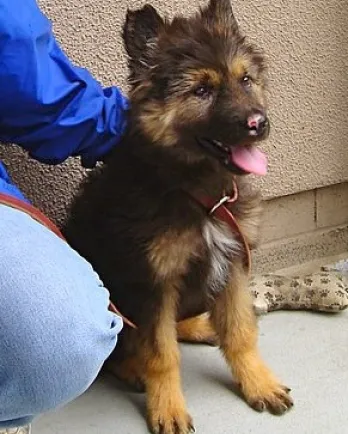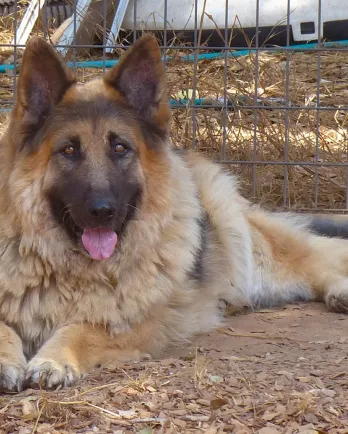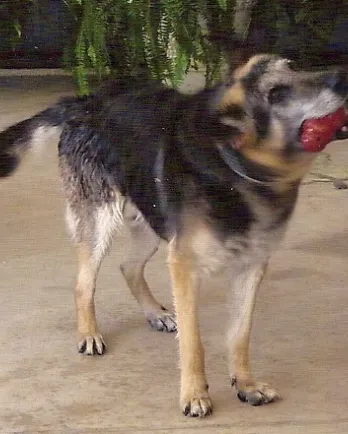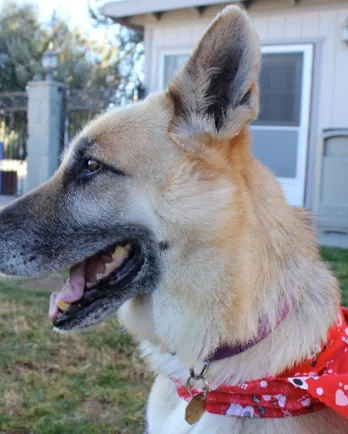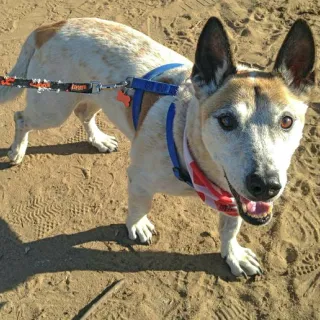Thulani Program: Helping the Most Vulnerable Dogs by Bob Jachens
Against this disturbing backdrop of knowing I was leaving good dogs behind, an incident occurred in late 2008 that ultimately led to a program to rescue these most vulnerable dogs. I was called to evaluate a three-month-old puppy that had been badly abused—burned with cigarettes, ears partially cut off, wounds on its body—just horrible things. What I found was a happy, affectionate puppy that just wanted to interact with us humans. An absolute delight. I agreed to take him into our program and lined up a foster home. Then I received a call from the shelter telling me that the puppy had a grade 5 heart murmur, one that indicated a fatal condition. Devastated, I called the foster family and told them that I could not pull the puppy because he was not adoptable. Two hours later, they called me to tell me they would take the puppy and give him the best life they could for what ever time he had left.
They named him Thulani, a South African Zulu word meaning "be quiet, be comforted."
The Idea
At that moment, I realized that there are special people who are not only selfless but emotionally strong enough to provide a home for a terminally ill dog, knowing full well that heartbreak would soon follow. Almost overnight, the Thulani Program was born.
Our basic premise was that we would rescue abandoned German Shepherds that had only a limited life expectancy, nominally six months to a year, and would find hospice homes in which they could live out their natural lives in love and warmth. Thulani candidates included terminally ill dogs, extremely old dogs, or often dogs who were both. A crucial aspect of the program was that we would cover all expenses, including medical, for the life of the dog.
We started slowly, exploring the magnitude of the need for such a program, the willingness of donors to support it, the availability of hospice homes willing to take in our dogs, and a whole host of other issues such a program would face. The Grey Muzzle Organization provided us a critical start-up grant of $2,000 in mid-2009 and a continuing grant in 2010 to investigate all of these issues and to begin bringing in dogs.
Over the next couple of years we found that the need for a program like Thulani is huge, that its mission strikes a very sympathetic chord with much of the public, and that families willing to provide hospice homes are out there, but would require constant effort on our part to recruit and support. As the magnitude of the effort necessary to run such a program and the cutting-edge nature of what we were trying to do came into better focus, the excitement level in our small group began to spiral upwards.
One of our earliest dogs, Hawkeye, was a retired, 13-year-old, partially blind, drug-sniffing dog whose owner/handler experienced some severe medical difficulties that made it impossible for him to care for Hawk. So the Thulani Program took him in. The hospice family expected a low energy ‘grandpaw’ that would integrate easily into their family; integrate he did, but low energy he was not. He took long walks with the pack and was then ready for more when everyone else crashed, he obsessed over his toys (always had something in his mouth), and he was wonderfully social with all creatures.
For six months he lived a full and happy life, but one day he stopped eating. Although we could not determine what was wrong, Hawk knew. In the words of his family, “Hawk had a plan. That afternoon, with all of his animal family and us standing by, he placed his head on our laps for some petting, turned around, lay down and passed away on his own terms, at his own time. It was a fitting end to a wonderful friend. Hawk had only been in our family for a few months but his paw print left an impression on our hearts that will last many years.”
It didn’t take many stories like Hawkeye’s to make us realize that a Thulani Program was desperately needed.
Taking The Plunge
Our confidence grew and in January 2012, with a certain level of fear and trepidation, we launched our full-scale program. Critical components made it nearly unique: we would only take in terminally ill dogs (including very old ones), would find hospice homes for them, and we would commit to cover all costs, including medical, for the rest of the dog’s life.
After nearly three years in full operation, we are proud of our accomplishments so far. The program has grown each year, and now stabilized at about 40-50 new dogs rescued each year. We have saved more than 125 dogs so far, over 80% seniors. The number of dogs in need, and the range of their specific problems, is astonishing. We took in a senior partially blind ex-drug-sniffing dog, a senior personal service dog, neglected breeder’s dogs and abused ‘guard dogs.’ We helped many senior and/or ill strays, dogs with heart conditions, kidney disease, cancer, degenerative myelopathy, hip or elbow dysplasia, severe malnutrition (see our ‘poster dog’ Holly ‘s video here), and open wounds, and we rescued numerous dogs that had been dumped at shelters simply because ‘they were too old.’ Stories about each of our dogs can be read on our website at the pull-down menu ‘our dogs,’ just by clicking on the dog’s picture.
For now our funding situation is stable and adequate to support the program. The Grey Muzzle Organization continues to provide essential baseline support with yearly grants, and the public has been forthcoming and generous in its support of our work.
Finding enough hospice homes is an ongoing challenge, but so far we are doing OK. Of course, we could always use more so that we could save more dogs.
An Unanticipated Benefit
We fully expected that we would save these most vulnerable dogs and that our volunteers would feel good about that, but what came as a huge surprise was the way the Thulani dogs brightened their new homes and how much shear joy they brought to the hospice family. The moving and inspiring testimonials we continually receive show the two-way nature of this work, helping both dogs and people. Kassidy’s and Sharron’s story is just one of many.
Kassidy came into the program as a 10 year-old female with mammary tumors that were inoperable. As with most advanced cancer patients, she had good days and bad, with the trauma of losing her home layered on top. Sharron tells her story best:
Sharron wrote that following a vet visit which revealed that Kassidy’s cancer had metastasized: “I curled up on her bed next to her with my head on hers and told her I wasn’t giving up on her yet, that she was my girl and we just weren’t done with each other yet. Well, she barely made it outside, peed and came back and went to sleep.” But amazingly, Kassidy rebounded.
Kassidy eventually lost her battle with cancer, but despite that tragic outcome, both Sharron and Kassidy were huge winners. “I want to thank you for letting me be a part of Kassidy’s life, to have that chance to love her and receive the same from her in return. She was my beautiful girl. I miss her terribly and so does Katie.”
A Plea
Perhaps the most important lesson growing out of our experience so far is that the need for Thulani-like programs is HUGE. This is especially true for the very old dogs. We get 4-5 times more requests than we can handle. And most areas do not have a program like ours. The dogs there have very little hope.
But it doesn’t have to be. The success of the Thulani Program demonstrates that, as improbable as it seems, programs like this are viable and sustainable. There just are a lot of great people out there ready to help. We want to encourage others to try establishing a Thulani-like program in their area. It is not all that difficult. Our website (thulanidogs.org) contains a lot of information that could be useful in setting up a program. And we would be happy to provide personalized advice and suggestions, and answer questions from any group wanting to start a new program. Just contact Bob at thulanidogs@gsrnc.org. We would love to help.
Try it!! It is not difficult and the personal rewards are amazing. It is one of the most fulfilling things I have done in my entire life.
For information about German Shepherd Rescue of Northern California's Thulani Program and the rest of The Grey Muzzle Organization's grant recipients, visit Who We Help.
The Grey Muzzle Organization improves the lives of at-risk senior dogs by providing funding and resources to animal shelters, rescue organizations, sanctuaries, and other nonprofit groups nationwide.


